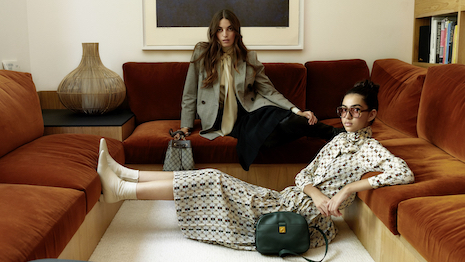- About
- Subscribe Now
- New York,
October 16, 2019

 Vestiaire Collective AW19 campaign. Image credit: Vestiaire Collective
Vestiaire Collective AW19 campaign. Image credit: Vestiaire Collective
The high-end pre-owned market may help, rather than harm, the overall luxury industry more than initially expected, according to new research from Boston Consulting Group and secondhand luxury platform Vestiaire Collective.
Resale platforms are often one of the first ways that up-and-coming consumers access and purchase luxury goods, with 71 percent of pre-owned buyers gravitating towards items they cannot afford new. Additionally, secondhand luxury appeals to more environmentally-conscious consumers as it keeps quality items from being discarded.
“The secondhand market prolongs the life of luxury products,” said Olivier Abtan, managing director/partner at BCG, Paris. “Most of what is sold on luxury secondhand platforms is of high quality, with 62 percent of the clothes either unworn or hardly worn.
“Brands wishing to be more eco-friendly benefit from this circular luxury economy,” he said
The findings are based on a survey of more than 1,000 Vestiaire Collective clients in October 2018, and on the basis of 12,000 respondents to the 2019 BCG x Altagamma survey.
Resale boosts luxury
The secondhand luxury market is expected to grow at a rate four times faster than the core luxury business, at an average 12 percent increase year-over-year compared to 3 percent growth. By 2021, resale is forecasted to account for 9 percent of the luxury market at a value of $36 billion.
Both sellers and buyers of secondhand luxury goods help contribute to overall luxury sales.
Vestiaire Collective dropped its commission rates and prices in an effort to attract more buyers and sellers. Image courtesy of Vestiaire Collective
Almost a third of sellers on Vestiaire Collective are looking to make room for new luxury goods by unloading their used clothing, and 44 percent buy more expensive pieces than they would have without selling their items.
Seventy percent of sales on the platform originate from sellers who report they rarely purchase secondhand.
Furthermore, about six in 10 respondents purchased brands for the first-time secondhand through Vestiaire Collective, with more than half of those open to purchasing those brands first-hand in the future.
Vestiaire Collective aligns itself with environmental causes
Accessibility and affordability is a major draw for most secondhand luxury consumers, with 96 percent reporting they are looking for value when they shop. The wide selection of styles, including products or brands that may no longer be available new, is another advantage in shopping resale.
Pre-owned platforms also extend the lifecycle of luxury clothing, as that majority of pieces listed on Vestiaire Collective are either unworn or rarely worn. More than 70 percent of millennial and Generation Z consumers try to shop ethically, indicating that luxury brands could benefit from positioning themselves as being supportive of secondhand retail.
Pre-owned partnerships
Consumers have more options for pre-owned luxury as retailers and brands are touting their commitments to the circular economy.
Online retailer Farfetch is extending its secondhand offerings for shoppers through a new alliance with donation service Thrift+.
The Thrift+ x Farfetch partnership will enable U.K. consumers to give their unwanted fashion to charity in exchange for site credit, letting them do good and get rewarded at the same time. This initiative follows Farfetch’s buy back program, which similarly seeks to offer a sustainable and circular alternative for used fashion (see story).
British fashion house Burberry is linking with luxury consignment marketplace The RealReal to encourage consumers to extend the lifecycle of their clothing.
Launched on National Consignment Day on Oct. 7, the alliance gives Burberry consumers an incentive to sell their pre-owned garments on The RealReal. This partnership follows a similar collaboration between The RealReal and Stella McCartney, as luxury brands take more responsibility in promoting the circular economy (see story).
Share your thoughts. Click here